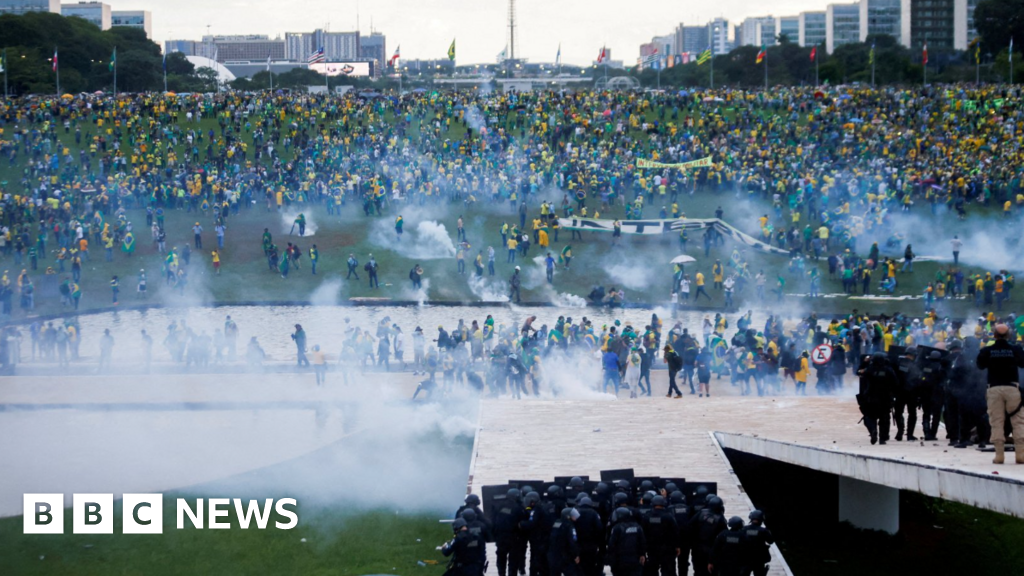ARTICLE AD BOX
By Guy Delauney
BBC News, Balkans correspondent
Image source, Reuters
Image caption,Family members rushed to the hospital in Bulgaria for news of their relatives
Flags are flying at half-mast around North Macedonia, as the country reacts with shock, confusion and grief to the bus accident in neighbouring Bulgaria which caused the deaths of 46 people.
Almost all of those who died were citizens of North Macedonia, a country of little over two million people.
The government has declared three days of national mourning as people take in the scale of the tragedy - and wait to hear why a long-weekend coach excursion to Istanbul turned into one of this young country's worst ever tragedies.
Image source, Getty Images
Image caption,Flags flew at half-mast across the Macedonian capital Skopje
There is little in North Macedonia's history since its 1991 declaration of independence to compare to this - although there are uncomfortable echoes of recent tragedies:
- Fifteen people died in a commuter bus crash near the capital Skopje two years ago
- In September this year, 14 people died in a fire at a hospital in Tetovo
- Two plane crashes in 1993 were the last serious transport-related incidents
Since then, only the 2001 insurgency by the Albanian National Liberation Army has caused a greater loss of life than the bus crash and fire.
As North Macedonia woke to reports of the incident in the early hours of Tuesday, people who thought their relatives might have been on board scrambled for information.
The bus was one of several operated by Besa Trans, a travel agency based in the capital, Skopje. It offers regular long-weekend trips to Istanbul, which are particularly popular with members of North Macedonia's large ethnic Albanian minority.
Relatives who went to look for answers at the Besa Trans office in Skopje's Old Bazaar found the doors locked and police guarding the entrance.
Image source, EPA
Image caption,The Skopje travel agency's doors were closed on Tuesday and guarded by police
The company later issued a statement through social media, saying it was "not able to respond to requests for information because we are in a state of shock". The statement added that the company was co-operating with officials in North Macedonia and Bulgaria.
Bekim Haliti was among those waiting in vain in front of the Besa Trans office. He was desperate for information about his wife, Hamije, and his sister - who were both listed as passengers on the bus.
"They do not answer the phone," he said. "We saw the list of names, but it does not say who is alive or who is not. We were at the Ministry of Foreign Affairs and got nothing there either."
Another man, Xhelal Bakiu, said he was trying to get information about his cousin.
"I called Besa Trans's number for three or four hours," he said. "We don't have any information from them."
Image source, AFP
Image caption,Relatives of those on the bus stood outside the offices of the travel company trying to get news
Some communities were hit particularly hard. A primary school in a Skopje suburb closed for the day after students learned that five of their classmates had died - all from the same family.
11-year-old Blerim Bushi told reporters that his friend, Ergin, had been on board the bus.
"He was a very good boy. I am so sorry that they died," he said.
Ergin was one of eight people on board with the family name Jahi. None of them were listed among the seven survivors - and local media reported that, in total, 10 members of the extended family had died in the accident..
For other relatives, there was relief. Adnan Jasharovski rushed to Bulgaria's capital Sofia to see his 16-year-old daughter Zulejha in hospital after she called him to say she had survived the crash.
"Her hands were burnt but otherwise fine," he said. "She didn't say much, she was crying and she was in shock."
An engaged couple in their 20s, Medina Ljutvi and Lulzim Sulejmani, also escaped the burning bus by climbing through a window near the back of the vehicle. But another engaged couple, also in their 20s, were both killed.
Watch footage from the scene where just a burnt out shell remained of the bus
The tragedy is a test for North Macedonia's government, which has been wobbling in recent weeks.
Its bungled response to the hospital fire in September which killed 14 people angered voters. That contributed to a defeat in last month's local elections - and a no-confidence motion that fell one vote short of bringing down Prime Minister Zoran Zaev's administration.
Mr Zaev was quick to arrive on the scene in Bulgaria - visiting the crash site, meeting survivors in hospital and holding a joint news conference with his Bulgarian counterpart, Stefan Yanev. He will be keenly aware that relatives and the country as a whole will want swift answers about the cause of the accident.
But for now, like everyone else, he will be relying on Bulgaria's investigation into what's thought to be Europe's worst road accident for more than a decade.

 2 years ago
159
2 years ago
159








 English (US)
English (US)